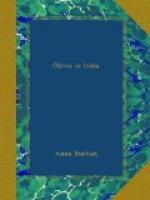The four houses, as I told you, stand in a compound. It isn’t exactly a garden, for there are lots of things in it that we would consider quite superfluous in a self-respecting garden. There is a good tennis lawn, plots of flowers, trimly-kept walks bordered with poinsettias, and trees with white, heavily-scented flowers, and opposite my bedroom is a little stone-paved enclosure where two cows and two calves lead a calm and meditative existence! And further, there are funny little huts scattered about where one catches glimpses of natives at their devotions or slumbering peacefully. Imagine in the middle of a garden at home coming on a cowhouse or a shanty! But this is India.
Boggley conducted me round, both of us talking hard all the time. He had so many questions to ask and I had so much to tell: all the home news and silly little home jokes—Peter’s latest sayings—things that are so amusing to tell and to hear but lose all their flavour written. You remember Boggley’s wild bursts of laughter? He laughs just the same now, throws his head back and shouts in the most whole-hearted way. We talked from 11 a.m. till tea-time without a break—talked ourselves hoarse and thirsty. After tea we drove on the Maidan, up and down the Red Road in an unending stream of carriages and motors, shabby tikka-gharries and smart little dogcarts (called here tum-tums)—all Calcutta taking the air. One might almost have imagined oneself in the Park, if it had not been that now and again a strange equipage would pass filled with natives, men and boys gorgeous in purple and scarlet and gold, or closed carriages like boxes on wheels, in which sat dark-skinned women demurely veiled. From the Red Road we drove to the Strand, a carriage-way by the river where the great ships lie, and watched the sun set and the spars and masts become silhouetted against the red sky. Then darkness fell almost at once.
My mind was a chaos when I went to bed after my first day in India, and I slept so soundly that when I woke I had no idea where I was. All re-collections of the voyage and arrival were wiped from my memory and I was filled first with vague astonishment and then with horror to find myself surrounded by filmy white stuff through which peered a black face. It was only my ayah, a quaint, small person, wrapped in a white sari, with demure, sly eyes and teeth stained red with chewing betel-nut, looking through the mosquito-curtains to see if the Miss Sahib was awake and would like chota-hazri. She embarrasses me greatly slipping about with her bare feet, appearing when I least expect her or squatting on the floor staring at me fixedly. I know no Hindustani and she knows perhaps three English words, so our conversation is limited. The silence gets so on my nerves that I drop hairbrushes and things to make a little disturbance, and it gives her something to do to pick them up. I must at once learn some Hindustani words such as pink, blue, and green, and then I shall be able to tell Bella what dress to lay out, and her place won’t be such a sinecure. I call her Bella because it is the nearest I can get to her name and it has a homely sound.




